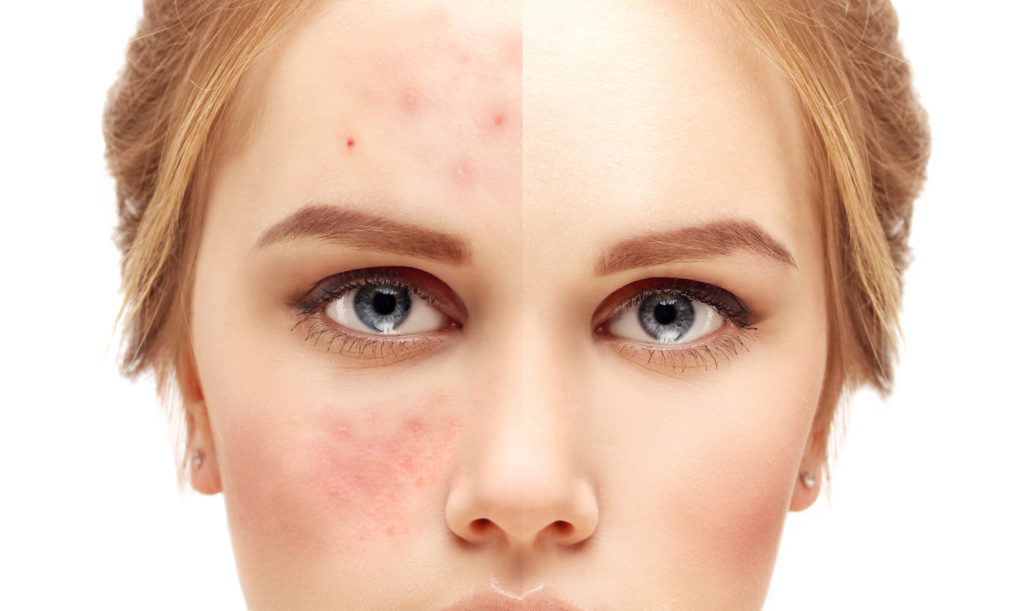In partnership with SA’s top medical aesthetic companies
The good news is that acne can be successfully treated.
People joke about “pizza faces” and spotty teens, but acne is a condition that is no laughing matter for sufferers – it affects them both physically and psychologically, and can cause social anxiety and isolation.
For teens, being proactive when the first signs of acne appear can help avoid a lot of emotional pain. For adults it can be equally embarrassing, when for example presenting at a work meeting, feeling conscious of their blemishes for all to see.
Understanding what you’re dealing with and how to tackle the issue will help you find the solutions you need. Early management is very important – best results are achieved with early detection, the correct treatments and a healthy lifestyle.
What is acne?
Acne is an inflammatory disease of the skin. Our skin’s sebum (oil) is produced by sebaceous glands. In healthy skin, the oil travels up the hair follicle onto the skin’s surface, where it performs a very important moisturising and protective function.
However, problems begin when there are changes to this process. First the pore becomes blocked by oil and dead skin. The plug on top darkens when exposed to air, forming a blackhead. If bacteria breed in the pore and break down the oil, white blood cells attack the bacteria, causing inflammation and pus, which results in a pimple.
All about the grades
Acne can be classified as mild, moderate or severe, depending on the degree of inflammation and infection.
Grade 1 – mild
This consists of blackheads that form mostly on the nose and the occasional red pimple.
This is the best time to treat skin to help normalise the oil production. It’s not necessary to see a doctor – you can consult a reputable skin-care therapist, who may recommend medical skincare products treatments, such as the Lamelle Clarity range and Acnevelle oral supplements, Neostrata, the Obagi Cleanziderm system and the Dermaquest DermaClear ranges, all available at Skin Renewal branches or through their online store.
Grade 2 – moderate
You’ll find a combination of blackheads, inflammation, redness, blind pimples and pimples (papules and pustules) on the skin, with those on the nose, cheeks and chin or jawline occurring more frequently. Scarring may occur from picking and squeezing.
If you haven’t taken action before, you have to do so now. Besides medical skincare, you should add deep-cleansing facials to your routine once a month and consider other technologies to help normalise your skin. If recommended, see a doctor or dermatologist before the situation becomes more severe.
Grade 3 – severe
In the more serious stages extremely painful inflammation and infection occur, with many pimples all over the face and neck, the chest, back and upper arms. It is now considered nodular or cystic acne, and should be managed with the help of a medical skin-care treatment programme, recommended and overseen by a medical doctor.
In severe cases patients are often put on medication that may cause internal damage to the body. At Skin Renewal, a more holistic approach is followed. Doctors may include lifestyle checks, gut health tests and blood tests to get to the root of the problem, while the patient uses topical skin-care treatments.
Your solutions of hope
Besides medical skincare, treatment options for acne-prone skin include, among other things, deep-cleanse facials, extraction peels and light technology. Using a combination of these treatments shows the best results:
Deep Cleanse Facials remove pimples and blackheads to facilitate healing of the acne with as little damage to the skin as possible.
Extraction Peels Facials consist of a peel combined with a Deep Cleanse Facial and a technology treatment.
Light technology treatments use laser or intense pulsed light (IPL), such as the Cutera IPL, Laser Genesis and Titan to shrink the sebaceous gland and pore size, reduce inflammation, and improve acne scarring and pigmentation. Genop’s Dermapen treatment also helps correct scarring and hollows left by acne.
While the acne is active and still in the inflammatory stage, treatments from Radiant Healthcare such as PDT (Photo Dynamic Light Therapy) and carboxytherapy can help to bring the inflammation under control, thereby calming infection, reducing redness and diminishing the pain felt in the skin.
Take the quick Beyond Beauty Survey and you could win a R2000 Skin Renewal voucher to spend in our online store, with free delivery within South Africa. T&Cs apply.
